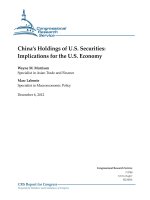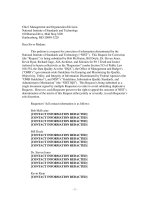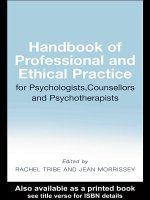Handbook of Professional and Ethical Practice for Psychologists, Counsellors and Psychotherapists pptx
Bạn đang xem bản rút gọn của tài liệu. Xem và tải ngay bản đầy đủ của tài liệu tại đây (2.54 MB, 358 trang )
Handbook of Professional and
Ethical Practice for Psychologists,
Counsellors and Psychotherapists
Closer regulation of psychological counselling means that an awareness of the
professional, legal and ethical considerations is vital.
The Handbook of Professional and Ethical Practice brings together leading therapists
and psychologists who have a wealth of knowledge and experience of their subjects.
Each chapter places particular emphasis on the current codes of practice and ethical
principles underpinning safe ethical practice and the implications for practitioners.
Comprehensive coverage of the legal, clinical and ethical considerations involved in
research and training is provided and the reflective questions at the end of every chapter
serve to prompt further discussion of the issues. The following subjects are covered:
•
Professional Practice and Ethical Considerations
•
Legal Considerations and Responsibilities
•
Clinical Considerations and Responsibilities
•
Working with Diversity – Professional Practice and Ethical Considerations
•
Research, Supervision and Training
This innovative handbook provides a supportive guide to the major professional, legal
and ethical issues encountered by trainees on counselling, clinical psychology
and psychotherapy courses, as well as providing an invaluable resource for more
experienced therapists and other members of the helping professions.
Rachel Tribe is a Senior Lecturer, Chartered Psychologist and Course Director in the
School of Psychology at the University of East London.
Jean Morrissey is a Registered Counsellor (BACP) and a lecturer at the School of
Nursing & Midwifery Studies, Trinity College Dublin.
Contributors: Nicola Barden, Nicola Barry, Jane Boden, Tim Bond, Robert Bor,
Michael Carroll, Adrian Coyle, Malcolm Cross, Emmy van Deurzen, Gráinne Ní
Dhomhnaill, Amanda Evans, Peter Forster, Tim Gallagher, Irvine S. Gersch, Andrew
Grimmer, Rebecca Haworth, Peter Jenkins, Martin Milton, Lyndsey Moon, Shirley
Morrissey, John Newland, Eleanor O’Leary, Camilla Olsen, Nimisha Patel, David
Purves, Digby Tantam, Allan Winthrop, Joanne Wood.
Handbook of Professional and
Ethical Practice for
Psychologists, Counsellors
and Psychotherapists
Edited by Rachel Tribe and
Jean Morrissey
First edition published 2005 by Brunner-Routledge
27 Church Road, Hove, East Sussex, BN3 2FA
Simultaneously published in the USA and Canada
by Brunner-Routledge
270 Madison Avenue, New York, NY 10016
Brunner-Routledge is an imprint of the Taylor & Francis Group
© 2005 Rachel Tribe & Jean Morrissey
Paperback cover design by Lisa Dynan
All rights reserved. No part of this book may be reprinted or
reproduced or utilised in any form or by any electronic, mechanical,
or other means, now known or hereafter invented, including
photocopying and recording, or in any information storage or
retrieval system, without permission in writing from the publishers.
This publication has been produced with paper manfactured to
strict environmental standards and with pulp derived from
sustainable forests.
British Library Cataloguing in Publication Data
A catalogue record for this book is available from the British Library
Library of Congress Cataloging-in-Publication Data
Handbook of professional and ethical practice for psychologists,
counsellors, and psychotherapists / edited by Rachel Tribe and
Jean Morrissey.
p. cm.
Includes bibliographical references and index.
ISBN 1–58391–968–6 (hbk.)—ISBN 1–58391–969–4 (pbk.)
1. Psychologists – Professional ethics. 2. Counsellors –
Professional ethics. 3. Psychotherapists – Professional ethics.
I. Tribe, Rachel. II. Morrissey, Jean. III. Title.
BF76.4.H365 2004
174′.915 – dc22 2004007118
ISBN 1–58391–968–6 (hbk)
ISBN 1–58391–969–4 (pbk)
This edition published in the Taylor & Francis e-Library, 2004.
“To purchase your own copy of this or any of Taylor & Francis or Routledge’s
collection of thousands of eBooks please go to www.eBookstore.tandf.co.uk.”
ISBN 0-203-32362-9 Master e-book ISBN
Rachel Tribe would like to dedicate this book to the memory of Richard
Brian Kenyon. To quote his son Kieron, ‘He did so much for so many and
never wanted reward or recognition.’ He was a very special person and we
miss him very much.
Jean Morrissey would like to dedicate this book to Mary and Patrick
Morrissey and Colin Brett: thank you all for everything.
Contents
List of tables and figures x
Contributors xi
Acknowledgements xvii
PART I
Professional practice and ethical considerations 1
1 Introduction 3
RACHEL TRIBE AND JEAN MORRISSEY
2 Developing and monitoring professional ethics and good practice
guidelines 7
TIM BOND
3 European guidelines to professional and ethical issues 19
DIGBY TANTAM AND EMMY VAN DEURZEN
4 Psychological contracts with and within organisations 33
MICHAEL CARROLL
5 The person in ethical decision-making: living with our choices 47
MALCOLM CROSS AND JOANNE WOOD
PART II
Legal considerations and responsibilities 61
6 Client confidentiality and data protection 63
PETER JENKINS
7 The legal context of therapy 77
PETER JENKINS
8 Writing a report for use in Court and appearing in Court as a health
professional and/or expert witness 91
ALLAN WINTHROP
9 The ethics and responsibilities of record keeping and note taking 105
DAVID PURVES
PART III
Clinical considerations and responsibilities 117
10 Referrals: clinical considerations and responsibilities 119
REBECCA HAWORTH AND TIM GALLAGHER
11 Complaints: professional ethical issues 131
TIM GALLAGHER AND REBECCA HAWORTH
12 Fitness to practise 145
NICOLA BARDEN
13 Suicide: professional and ethical considerations 159
JANE BODEN
14 Working in a healthcare setting: professional and ethical challenges 171
AMANDA EVANS AND ROBERT BOR
PART IV
Working with diversity – professional practice and
ethical considerations 183
15 Professional and ethical considerations when working with children
and adolescents – an educational psychology perspective 185
IRVINE S. GERSCH AND GRÁINNE NÍ DHOMHNAILL
16 Professional and ethical issues when working with older adults 197
ELEANOR O’LEARY AND NICOLA BARRY
viii Contents
17 Professional and ethical practice in the consulting room with
lesbians and gay men 209
LYNDSEY MOON
18 Professional and ethical issues when working with learning disabled
clients 221
PETER FORSTER AND RACHEL TRIBE
19 Professional and ethical practice in multicultural and
multiethnic society 233
JOHN NEWLAND AND NIMISHA PATEL
PART V
Research, supervision and training 247
20 Research in therapeutic practice settings: ethical considerations 249
ADRIAN COYLE AND CAMILLA OLSEN
21 The ethics (or not) of evidence-based practice 263
MARTIN MILTON
22 Mandatory personal therapy for therapists: professional and
ethical issues 277
ANDREW GRIMMER
23 Teaching ethics for professional practice 291
SHIRLEY MORRISSEY
24 Training supervision: professional and ethical considerations 303
JEAN MORRISSEY
25 Trainee perspectives on professional and ethical practice 317
RACHEL TRIBE
Appendix: List of resources 333
Index 335
Contents ix
List of tables and figures
Tables
2.1 Comparison between ACA and BACP ethical guidance on
confidentiality 11
3.1 Range of modalities being practised in European countries 21
3.2 Coverage of statement of principles of European Association for
Psychotherapy 29
3.3 Competing loyalties: the professional backgrounds of European
psychotherapists 30
23.1 Content for the Ethics and Professional Practice unit 297
23.2 An ethical decision-making procedure 298
Figures
3.1 Regulation of psychotherapy in Europe 24
4.1 Eight contracts at work in the counselling system 36
4.2 Interpreting reality 39
4.3 Influences on the psychological contract 40
5.1 Kelly’s Experience Cycle (1970) 53
21.1 Representation of official evidence-based practice 269
Contributors
Editors
Rachel Tribe is a Chartered Counselling and Organisational Psychologist,
currently employed as Course Director on the Counselling Psychology
course at the University of East London. She has published widely and
regularly contributes to national and international conferences. She has
worked in the UK and a number of other countries.
Jean Morrissey is a Registered Counsellor (BACP) and a lecturer at the School
of Nursing & Midwifery Studies, Trinity College Dublin (formally an
associate professor at the Chinese University of Hong Kong). She
originally trained and worked as a general and psychiatric nurse before
becoming a counsellor and supervisor. She has worked as a counsellor
and supervisor in voluntary, educational and hospital settings in the UK,
Ireland and Hong Kong. She has published on issues relating to training
supervision.
Authors
Nicola Barden is currently Head of Counselling at the University of
Portsmouth. A registrant of both UKCP and BACP, she is Deputy Chair
of BACP and chairs its Professional Standards Committee. She was
Editor of the CPJ from 2000 to 2002. Previous publications include ‘The
responsibilities of the supervisor in BACP’s codes of ethics and practice’
in Wheeler and King, The Responsibility of the Supervisor (Sage 2000),
and Rethinking Gender and Therapy (Open University Press 2001),
co-edited with Susannah Izzard.
Nicola Barry MA is a Registered Psychologist and College Lecturer in the
Department of Applied Psychology, University College Cork. She is the
Assistant Course Director of the Higher Diploma in Guidance and Coun-
selling and co-author of articles in the area of Gestalt reminiscence
therapy.
Jane Boden is an Accredited Counsellor with the BACP working within both
public and private sectors. She is also the principal infertility counsellor for
the Hull IVF Unit and Accredited Cruse Bereavement Counsellor and
Supervisor. Jane lectures at the University of Hull, where she gained her
MSc in Counselling, and is currently reading for a PhD.
Tim Bond is a Fellow of BACP and a Reader in Counselling and Professional
Ethics at the Graduate School of Education, University of Bristol. He was
chair of BACP 1994–96. He has numerous publications but his two most
significant recent ones are Standards and Ethics for Counselling in Action
(second edition) (Sage 2000) and The Ethical Framework for Good Prac-
tice in Counselling and Psychotherapy (BACP 2002). He is a leading writer
in the area of practice and ethical issues in therapy.
Robert Bor is a Consultant Clinical Psychologist at the Royal Free Hospital,
London, where he works in the Infection and Immunity Directorate. He is
a Chartered Clinical, Counselling and Health Psychologist as well as a
UKCP Registered Family Therapist. He is also Emeritus Professor of
Psychology at London Metropolitan University and a Visiting Professor
at City University, London. He has many years of experience of working
with individuals, couples and families affected by acute and chronic illness.
He has published numerous books and academic papers on this and
related topics.
Michael Carroll is a Fellow of the BACP, a Chartered Counselling Psycholo-
gist and a BACP Senior Registered Practitioner. He works as a counsellor,
supervisor, trainer and consultant to organisations in both public and
private sectors, specialising in the area of employee well-being. He is Visiting
Industrial Professor in the Graduate School of Education, University of
Bristol, and the winner of the 2001 BPS Award for Distinguished Contri-
butions to Professional Psychology. He has published widely particularly
in the areas of clinical supervision and counselling in organisations His
most recent book is Integrative Approaches to Supervision (edited with
Margaret Tholstrup; Jessica Kingsley, 2001).
Adrian Coyle is Senior Lecturer and Research Tutor for the Practitioner
Doctorate in Psychotherapeutic and Counselling Psychology in the
Department of Psychology, University of Surrey. His research interests
include lesbian and gay psychology, identity, spirituality/religion,
bereavement and qualitative research approaches. To date, he has
(co-)written 35 journal articles and 16 book chapters and co-edited
Lesbian and Gay Psychology: New Perspectives (BPS Blackwell, 2002).
Malcolm Cross is Director of Counselling Psychology Programmes, City
University, London. He is also a UKCP Registered Psychotherapist and
Chartered Counselling Psychologist. An active practitioner and researcher
xii Contributors
with numerous academic articles, book chapters and books to his name.
His most recent book is Reporting in Counselling and Psychotherapy: A
trainee’s Guide to Preparing Case Studies and Reports, prepared in
collaboration with Papadopoulos and Bor.
Emmy van Deurzen directs the New School of Psychotherapy and Counsel-
ling in London, where she is a Professor in Psychotherapy with Schiller
International University. She is also Co-Director, of the Centre for the
Study of Conflict and Reconciliation at the University of Sheffield. She
has written extensively on the application of philosophical ideas to psy-
chotherapy and runs a private practice. She founded the Society for
Existential Analysis and created numerous courses in psychotherapy
for academic institutions. She is a fellow of the BACP and BPS and
has also been external relations officer to the European Association for
Psychotherapy.
Gráinne Ní Dhomhnaill is employed as a Lecturer in Psychology in the Educa-
tion Department, University College Dublin. Her work involves training
educational psychologists as well as the initial and continuing professional
development of teachers. She has served as President of the Psychological
Society of Ireland, and is a former Course Director of the professional
training programme for educational psychologists. Gráinne has presented
papers at international conferences, and retains an international perspective
on the development of educational psychology.
Amanda Evans initially trained as a humanistic counsellor and later as a
Counselling Psychologist and has worked as a counsellor in secondary
healthcare for 16 years. She specialised in working with people affected by
HIV infection including patients, partners, families and children from
widely diverse backgrounds and at all stages of HIV infection from initial
diagnosis to death. She is involved in co-coordinating the training and
supervision of counselling staff in a busy HIV testing clinic and the training
of counsellors specialising in this field.
Peter Forster is employed in Tower Hamlets, East London, on the community
team for learning disabilities. He is a Chartered Counselling Psychologist
and has extensive experience of working in a number of clinical settings,
which include mental health, primary care, and learning disabilities.
Tim Gallagher is a Chartered Counselling Psychologist with experience of
working in independent therapy practice, NHS adult mental health, clin-
ical health and primary care in various locations. He also worked as a
manager in the NHS and voluntary sector and has published in the areas
of stress and coping strategies.
Irvine S. Gersch has worked as a schoolteacher, university lecturer, and
principal educational psychologist. He is Course Director of the MSc
Contributors xiii
professional course of training for educational psychologists. He has
published widely in the fields of SEN, school systems, behaviour man-
agement, listening to children, conciliation, and training, educational
leadership and management. He is a member of the Government
advisory group on the future training of educational psychology and a
Fellow of the BPS. In 2002 he was awarded the distinguished award by
the BPS for professional practice in psychology, in recognition of his
pioneering work.
Andrew Grimmer is an accredited BACP Counsellor and a full member of the
New Zealand Association of Counsellors. He works as a counsellor in a
tertiary education counselling service and in private practice. He has a
particular interest in mandatory personal therapy and has carried out
research on the subject with counselling psychologists. He currently lives
in Auckland, New Zealand.
Rebecca Haworth, Chartered Clinical Psychologist, has experience of work-
ing in a private consultancy – specialising in child and adult mental
Health, including an expert witness service. She has also worked in a range
of NHS settings for over 10 years, and has particular interest working with
adults, families and children in primary care settings. She has undertaken a
range of additional training in brief solution-focused therapy with indi-
viduals and families, psychoanalytic psychotherapy and group work. She
has published several journal papers.
Peter Jenkins is a Lecturer in Counselling at the University of Manchester
and a member of the Professional Conduct Committee of the British
Association for Counselling and Psychotherapy. He is the author of Coun-
selling, Psychotherapy and the Law (Sage 1997), co-author with Debbie
Daniels of Therapy with Children (Sage 2000), and editor of Legal Issues in
Counselling and Psychotherapy (Sage 2002).
Martin Milton UKCP Reg is Course Director (Practice) of the University of
Surrey Practitioner Doctorate in Psychotherapeutic and Counselling
Psychology. He is also Consultant Counselling Psychologist and Regis-
tered Psychotherapist with North East London Mental Health Trust. His
research and specialist interests include lesbian and gay affirmative
psychology and psychotherapy, HIV-related psychotherapy and existential
psychotherapy. He has previously served on the committee of the BPS
Lesbian and Gay Psychology section and was one of the co-editors of
its Newsletter. He is currently one of the Division of Counselling Psy-
chology’s representatives to the Admissions Committee of the BPS and
consulting editor to Counselling Psychology Review.
Lyndsey Moon is a Chartered Counselling Psychologist and Fellow of the
University of Newcastle. She is External Examiner for the University of
xiv Contributors
Teesside and a former lecturer in counselling psychology. She has worked
for the NHS in the field of substance misuse and addictions and for a
lesbian, gay and bisexual alcohol counselling project in Soho, London.
Shirley Morrissey is a Clinical and Health Psychologist in private practice in
Australia. She was previously course director for an MSc programme in
counselling psychology in the UK. She is a member of the APS, BPS,
BABCP and AACBT. She has won several awards during her career in
Australia, including a grant for research into ethical dilemmas with an
honours student. She conducts workshops in CBT, supervision, and
ethical practice, has presented numerous conference papers, and is well
published.
John Newlands is a Chartered Clinical Psychologist. He has worked for over
10 years in the multicultural London Borough of Islington. He has a
strong interest in promoting inclusive thinking and practice for black and
minority ethnic people with learning disabilities. Within the Division of
Clinical Psychology, he held the post of elected Chair of the ‘Race’ &
Culture Special Interest group from 1994 to 1998. His published work
focuses on understanding ethnic identity. He is a visiting lecturer to several
clinical psychology training courses.
Eleanor O’Leary is Director and Principal Investigator of the Cork Older
Adult Intervention Project at University College Cork. She has written
and researched extensively on the subject of older adults. Her work has
been translated into Greek, Italian, Chinese and Uzbek. Her book, Coun-
selling Older Adults, is one of two key international books in the area.
Camilla Olsen is a Chartered Counselling Psychologist. She is currently
employed in a Community Mental Health Team and is involved as a ther-
apist with a psychosis relapse prevention study carried out by Professor
Garety and Professor Kuipers at the Institute of Psychiatry at Maudsley
Hospital. She is a Visiting Lecturer at City University, teaching students
on a certificate course in counselling psychology and at Surrey University
teaching students on PsychD in Psychotherapeutic and Counselling
Psychology.
Nimisha Patel is a Senior Lecturer in Clinical Psychology at the University of
East London, a Consultant Clinical Psychologist, and Head of Clinical
Psychology at the Medical Foundation caring for victims of torture. She
also worked for many years in the NHS as a practitioner/clinician and
researcher and in developing clinical practice and services for a multi-
ethnic population. She has published widely on issues of working with
difference and discrimination in psychological health services.
David Purves is a Principal Lecturer in Counselling Psychology at London
Metropolitan University. He gained his doctorate from Oxford University
Contributors xv
in 1994. Since that time he has become both a Chartered Counselling
Psychologist and Psychotherapist. Dr Purves has a long-held interest in
ethics and teaches a popular course on this topic. He also has both
research and practice interests in the field of posttraumatic stress disorder
and maintains an NHS practice in this field. He has published and spoken
both nationally and internationally on this subject.
Digby Tantam is Clinical Professor of Psychotherapy at the University of
Sheffield. He is a practising psychotherapist, psychiatrist and psychologist.
He is Co-Director of the Centre for the Study of Conflict and Reconcili-
ation at the University of Sheffield, and a partner in Dilemma Consultancy
in Human Relations. He served as Registrar of the European Association
of Psychotherapy (1999–2001) and Chair of the UKCP (1995–98). He has
published extensively; his most recent book is Psychotherapy and Counsel-
ling in Practice. A narrative approach (Cambridge University Press 2002).
Allan Winthrop is Director of Counselling Psychology programmes at Teesside
University. He is a Consultant Chartered Counselling Psychologist. He
previously worked in the NHS and is now a partner in a private psych-
ology practice. He has a postgraduate diploma in law and holds the
Common Professional Exam (CPE) in law. He is a full member of the
Society of Expert Witnesses and is recognised as a psychology provider by
various health insurance schemes.
Joanne Wood is an Associate Lecturer at City University, London, and prac-
tises as a Psychologist in a child and adolescent mental health service. She
has extensive experience working in primary and secondary adult mental
health settings and also within specialist addiction agencies. Prior to train-
ing as a counselling psychologist, Joanne worked as a professional human
resources specialist for a number of blue chip companies in the city of
London. Her current research interests are related to the training and
development of counsellors and therapists and the application of theory
to practice.
xvi Contributors
Acknowledgements
We have received help, support and encouragement from many people in
writing this book, particularly Irene So, Dorcas Shuen and Robert Sherman.
We would like to thank all the contributors who have given so generously
their time and effort to writing their chapters. We are indebted to Andrew
Kilburn who kindly agreed to act as a reader for this book and made valuable
and insightful comments on the text. Our gratitude also goes to Ken Fisher
for his artistic skills and humour.
As editors, we particularly value the support and encouragement we gave
to each other throughout this project, which at times presented some
unexpected challenges. We acknowledge and value the knowledge and experi-
ence we have gained from all the clients, supervisees and trainees we have
worked with in the UK and abroad.
Finally, we want to thank email, which enabled us to communicate across
continents and time zones with such great speed and success; without it this
book may not have been completed.
Professional practice and
ethical considerations
Part I
Introduction
Rachel Tribe and Jean Morrissey
There is no doubt that professional and ethical practice is a potent and
dynamic area. Changes in research and practice, legislation, and professional
and ethical guidelines may all mean incremental and paradigm shifts. In
addition, changing professional codes of practice, culture, and personal
belief systems, as well as the demands of clinical governance, lifelong learn-
ing and the likelihood of statutory registration, will also impact upon profes-
sional and ethical practice. Accordingly, we believe that the challenges in this
area of practice are among the things that make it an interesting and vibrant
one. The juxtaposition of the personal and professional is central to profes-
sional and ethical practice and is written about in this book by a number of
authors. Our aim in producing this book was to make it as comprehensive as
possible; inevitably constraints of space (and therefore price) meant that we
had to omit areas we might ideally have liked to include. Therefore, we
decided to include the areas which, we believe, are of most importance both
to trainee therapists, psychologists, and counsellors, and to experienced prac-
titioners. An issue within this area which we believe is vital but did not war-
rant an entire chapter in this book is the necessity of practitioners taking
responsibility for their own continuing professional development (CPD).
While different professional bodies have slightly different views and condi-
tions about this, the recognition of continuing professional development
for all therapists is becoming mainstream and is in our view an essential
requirement of professionalism.
Throughout this book particular emphasis is placed in each chapter on the
current codes of practice and ethical principles underpinning safe ethical
practice and the implications for practitioners. Therefore each author was
asked to focus on the particular professional and ethical issues in his or
her area of expertise and on the challenges they present in clinical practice.
The importance of considering diversity is also paramount and this theme
runs throughout the book. Different audiences may be guided by different
ethical codes, cultures of practice and training, among which there are many
similarities and some differences. Notwithstanding this, the importance of
Chapter 1
ethical awareness and practice for all therapists or practitioners working in
therapeutic environments share a common underlay. Given the boundaries of
this book, it was not feasible to cover all eventualities related to professional
and ethical practice or the contexts in which they occur. Instead, this book
aims to foster the professional judgement of the reader, which is required to
manage the often complex and challenging ethical issues unique to each situ-
ation. The latter is illustrated throughout the various clinical case examples in
the respective chapters.
The book is divided into five parts. Each chapter is written by someone
who is an experienced practitioner or specialist in the area of practice that
they have written about. The authors represent different constituencies,
including BACP, BPS, and UKCP, as well as a range of theoretical orienta-
tions. Part I entitled ‘Professional practice and ethical considerations’,
describes the development and monitoring of professional ethics in con-
temporary Britain and the USA as well as in various European countries
and what we might learn from them. The following chapter addresses issues
concerning the concept of professional contracts with and within organisa-
tions and how they can be negotiated to create healthier relationships and
more positive working environments. The final chapter in this section dis-
cusses the ‘person’ in ethical decision making and the varying degrees of
discomfort that can arise between ethical principles and personal values as
well as its impact on the therapeutic work. The first two chapters in Part II,
‘Legal considerations and responsibilities’, provide a comprehensive over-
view of the professional responsibilities as they relate to the legal context of
therapy. The following chapters focus on specific professional and legal con-
siderations and responsibilities of record keeping, writing a report for use in
court reports and appearing as an expert witness. Part III, ‘Clinical con-
siderations and responsibilities’, covers specific areas and the accompanying
professional and ethical challenges that apply to the practice of therapy,
including managing referrals and complaints, fitness to practise, suicide risk
and working in a multidisciplinary team in a healthcare setting. The pen-
ultimate part, ‘Working with difference – professional practice and ethical
considerations’, focuses on issues of working with diversity, including age,
sexual orientation, disability and race, and the importance of such issues in
the consulting room. The final part, ‘Research, supervision and training’,
highlights the importance of research and the challenges of undertaking
research in clinical practice. Current debates surrounding evidence-based
practice are also discussed. This is followed by an examination of personal
therapy, the teaching of ethics and professional practice and clinical super-
vision as key components in the process of becoming a psychologist, coun-
sellor or psychotherapist. The final chapter presents trainees’ perspectives
of professional and ethical issues based on their experiences in clinical
practice.
4 Professional practice and ethical considerations
Finally, as editors we hope the reflective questions at the end of each
chapter will act as a springboard for ongoing discussion, reflection and
learning concerning the many complex and challenging professional and eth-
ical issues each therapist is confronted with in an ever-changing therapeutic
environment.
Introduction 5









